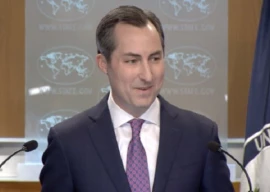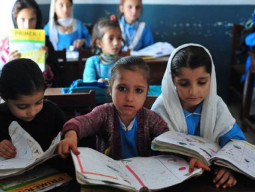
During his recent address to the flood victims of Skardu and Ghanche districts in Gilgit-Baltistan, the prime minister reiterated the narrative of building motorways to relieve people from floods. It does not take a rocket scientist to prove that highways, bridges and metros will not stop the inundation of flood water in villages and cities.
It is an unfortunate and shameful fact that large areas of our country suffer from acute water shortage, with people in rural areas rarely able to access potable water, yet millions of gallons of rainwater is allowed to fall into the sea every monsoon season, due to a lack of storage facilities.
Illegal constructions near water channels and dumping garbage into waterways are two examples of how ‘responsibly’ we behave. It is very convenient to blame our neighbouring country for all our shortcomings. In fact, this tendency only brings us shame when a number of our pseudo intellectuals in the media hold India responsible for bringing floods in Pakistan. We take pride in shifting responsibility on to others, but hardly do we try to correct our own selves.
Do we not open the spill ways of our barrages when the water levels rise past the highest degree to avoid any possible damage to our dams? If we do so then why should we expect others not to open their spillways when their dams’ capacity has been met? The real problem lies in our inability to build larger dams or even the small ones for that matter.
From levelling accusations on other provinces of water theft, to committing corruption, our politicians come up with almost every excuse to stop the project of building a water-storage facility, from completing. To them, petty issues hold higher priority, as they are very well aware that the nation has a short memory and will forget the atrocities of the current floods by the time the horrific episode repeats itself next year.
Published in The Express Tribune, August 7th, 2015.











1734511806-0/Untitled-design-(5)1734511806-0-270x192.webp)
1734587529-0/Express-Tribune-(1)1734587529-0-270x192.webp)


1734468458-0/Copy-of-Untitled-(50)1734468458-0-270x192.webp)







COMMENTS (1)
Comments are moderated and generally will be posted if they are on-topic and not abusive.
For more information, please see our Comments FAQ